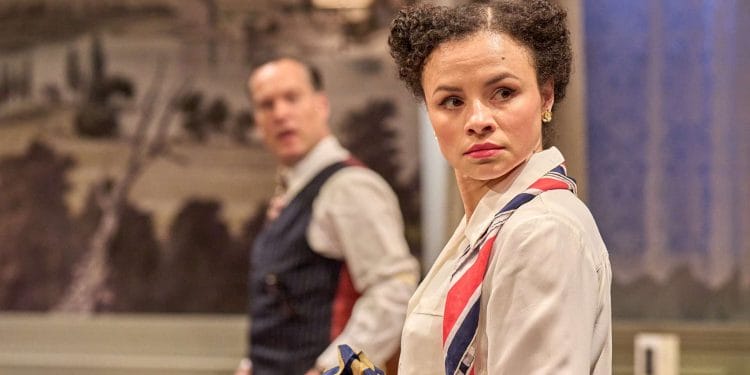 Chances are you don’t know who Lillian Hellman was. The communist activist, accomplished writer, and playwright blacklisted by the House Committee on Un-American Activities has flown under the radar and we are all the worse for it. The Donmar Warehouse’s new production of her 1941 play Watch on the Rhine serves not just as an exhibition of her talent, but an overdue celebration of the playwright.
Chances are you don’t know who Lillian Hellman was. The communist activist, accomplished writer, and playwright blacklisted by the House Committee on Un-American Activities has flown under the radar and we are all the worse for it. The Donmar Warehouse’s new production of her 1941 play Watch on the Rhine serves not just as an exhibition of her talent, but an overdue celebration of the playwright.
In 1940, Sara returns to her family home in Washington after twenty years in Germany with her husband Kurt, a searingly vulnerable Mark Waschke, and three precocious children. Kurt’s anti-fascist political allegiance clashes with a family friend staying at the house, the unctuous Teck de Brancovis, an aristocratic Romanian and Nazi sympathiser clad in pinstripes and living in limbo away from Europe.
As inevitable tensions begin to boil between the two, everyone is soon confronted with ethical duty. Apathy is no longer an option; the war is as much in the living room as it will be on the battlefield. Watch on the Rhine is an ethical litmus test that would have demanded a response from Americans whose ethnicity would not have determined their allegiance. It is not so much interested in which way the moral compass points, but with who will go where it demands. A Chekhovian family drama charged with Brechtian politics.
Sara’s bourgeois mother Fanny, played with endearing snobbery by a luminous Patricia Hodge, is caught in the crossfire. It is staggering to think that the play premiered merely months before America joined World War Two, a prophetic artistic feat from Hellman. Just as Fanny must choose, so must America.
Director Ellen McDougall weaves an astute metatheatrical awareness of the play’s political situatedness into her artistic vision. It’s not an attempt to modernise the text, the audience seemingly watch the play in retrospect.
Basia Bińkowska’s set enhances the theatrical time warp with a curious interplay of naturalistic and expressionistic elements. Set in a living room north of Washington, she articulates the comforts of a 1940s upper middle-class life with garnishes of cinematic flare. A curtain-cum-analogue TV screen bookends the performance with 1940s style title cards. Flashes of static noise flicker in and out to accentuate tense exchanges.
The resulting temporal flux deliberately defangs Watch on the Rhine of its political fervor: it is not the clarion call to take a stand against fascism that it would have been when it premiered in 1941. Instead it is a potent homage to and loving examination of a playwright who had the audacity to warn America about what happens when good men do nothing.
Of course it would be naïve to ignore the contemporary parallels. Just as in Hellman’s time, a belligerent dictator wages war in Europe in the name of nationalism, but Hellman as a writer and activist is always the primary focus. McDougall thrusts Hellman into the limelight and demands that her name be etched in the history books not only alongside the heavyweight political playwrights of the 20thcentury, but also next to the activists who resisted the terrifying tide of fascism.
Watch on the Rhine plays at the Donmar Warehouse until 4th February.


















Comments 3